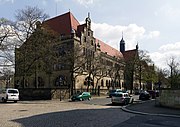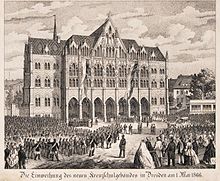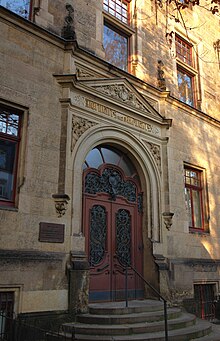Cross school
| Evangelical Kreuzgymnasium | |
|---|---|

|
|
| type of school | high school |
| founding | 13th Century |
| address |
Dornblüthstrasse 4 |
| place | Dresden |
| country | Saxony |
| Country | Germany |
| Coordinates | 51 ° 2 '50 " N , 13 ° 48' 5" E |
| carrier | Evangelical Lutheran church districts Dresden |
| student | around 800, including 150 Crucians |
| Teachers | about 70 |
| management | Jörg Wetzel |
| Website | kreuzgymnasium.de |
The Evangelische Kreuzgymnasium (also known by its Latin name schola crucis ) is the oldest still existing school in Dresden and one of the oldest in Germany . A schoolmaster ( Cunradus rector puerorum ) was mentioned for the first time in 1300 . It was a parish school that passed into the sovereignty of the city from the end of the 14th century and received the first school regulations in Dresden in 1413. The singers of the capella sanctae crucis ( Kreuzkirche ), today's Dresden Kreuzchor, were trained in it .
Today the Kreuzschule is a Protestant grammar school , whereas the Dresden Kreuzchor and its alumni run through the city of Dresden. All members of the Dresden Kreuzchor (Kruzianer) from the 5th grade onwards are students of the Kreuzgymnasium. However, non-Crucians can also attend the school.
history
The history of the Kreuzschule is closely linked to that of the Kreuzkirche . Its forerunner was a "Nikolaikirche" consecrated in this name. In this period of the High Middle Ages, education took on a new role. Schools were often attached to city churches. A schoolmaster was responsible for teaching, among other things, theology, as has been documented for the city since 1300.
The church also had a relic with a splinter from the cross of Christ and was mentioned in 1319 as ecclesia sanctae crucis (cross church) because of the great importance of the Catholic cross worship . With it, the city school, first mentioned in 1371, was established. In 1393 the first school building was opened on the south side of the Kreuzkirche. Due to the close connection between the city and the present Kreuzkirche , the term Kreuzschule gradually became common for the actual urban school building.
It was not until 1866 that a significantly more spacious new building was built on Georgplatz . This building fell victim to the destruction during the air raids on Dresden in 1945 . Since then, the school has been located in the building of the former Freemasons Institute on Eisenacher Strasse in the Striesen district .
The school was one of nine schools in the GDR that offered ancient language teaching (Latin and ancient Greek). From 2007 to 2009 it was completely refurbished so that the school was temporarily held in the former Erich-Wustmann-Gymnasium in Dresden- Prohlis . The re-inauguration took place on August 10, 2009 by regional bishop Jochen Bohl .
On July 16, 1882, 7 former students of the Kreuzschule on the Rudelsburg founded the "Litterarian Evening in Leipzig", a regular student table during their joint studies in Leipzig . As was usual for student associations in those years, the founders chose colors for their regulars' table. In memory of the Kreuzschule this was light blue-silver-light blue, which however had to be changed to light blue-silver-dark blue due to objections from an older student union . The “Litterarian Evening” developed into an academic gymnastics association , which continues the Dresden tradition as the Leipzig Gymnastics Association Fridericiana zu Mannheim / Heidelberg in the Coburg Convent . The coat of arms of Fridericiana is still adorned with a silver cross on a light blue background at the top right.
School profile
All students learn English from the 5th grade. Since the 2010/2011 school year, it has also been possible to choose between Latin and French as a second foreign language from year 5 onwards. Greek can also be learned as a third foreign language. From the 8th grade onwards, all students can choose between an artistic, scientific, linguistic or humanities and social science profile. Despite the Protestant sponsor, students from other denominations or non-denominational students can also attend the school. However, participation in religious education is compulsory for all students. The subject ethics is not offered.
Members of the Kreuzchor will be in the 5th – 7th Classes taught separately to compensate for the double burden of choir and school as well as missed lessons due to rehearsals and tours. As early as the 3rd grade, boys can be accepted into a preparatory class of the Kreuzchor, which is assigned to the 63rd elementary school, if they are suitable.
The students regularly take part in church services (in the Kreuzkirche or in neighboring churches) and in devotions in the school as well as project and reflection days with a religious background and support charitable projects.
School fees
As a privately owned school, the Kreuzgymnasium charges school fees. In addition, a contribution is made by the parents in the form of the "Kultureuro", which serves to support special activities and projects.
Known students
- Theo Adam
- Oscar Wilhelm Becker
- Hans Beschorner
- Michael von Brück
- Ludwig Schnorr von Carolsfeld
- Franz Schnorr von Carolsfeld
- Eduard Chambon
- Carl Friedrich August Dathe von Burgk
- Albert Dietrich
- Moritz Döring
- Georg Eckelt
- Kurt Exner
- Gustav Theodor Fechner
- Gotthard Daniel Fritzsche
- Oskar Yellow Hair
- Johannes Gelbke
- Emil Arthur Gleitsmann
- Graun brothers
- Rudolf Biedermann Günther
- Friederike de Haas
- Johann Georg August Hacker
- Hartmut Haenchen
- Georg Friedrich Hammer
- Gustav Helbig
- Jürgen Helfricht
- Carl Friedrich Heinze
- Wolfgang Hinze
- Johannes Huebschmann
- Otto Immisch
- Christian Juncker
- Gottlieb Kiessling
- Udo Klement
- Christian Kluttig
- Theodor Körner
- Asteris Koutoulas
- Sebastian Kranich
- Woldemar Lippert
- Gustav Eduard Lösche
- Thomas Löser
- Alfred Lottermoser
- Arkadi Maslow
- Frido Mětšk
- Franz Niedner
- Hans Oster
- Ernst Robert Osterloh
- Gottlieb Friedrich Otto
- René Pape
- Martin Petzoldt
- Paul Pfotenhauer
- Hans-Christoph Rademann
- Rolf Reuter
- Karl Richter
- Peter Rösel
- Arnold Schering
- Rudolf Schilling
- Otto Eduard Schmidt
- Richard Schmidt
- Günter Schnabel
- Wilhelm Schöpff
- Peter Schreier
- Martin student
- Ingo Schulze
- Friedrich Oskar v. black
- Rudolf Seydel
- Johann Friedrich Ernst Stange
- Heinrich von Treitschke
- Daniel Gottlob Turk
- Richard Wagner
- Christian Wermuth
- Walther Witting
- Kurt Albrecht Wolf
Known teachers
- Peter von Dresden (1409–1412 at the Kreuzschule), a follower of the Hussites , the famous Christmas carol In dulci jubilo also appeared in one of his song collections .
- Nicolaus Tirmann († 1437), author of the first school regulations, Peter's successor
- Nicolaus Caesius (Groe) from Coburg, first rector since the Reformation
- Joh. Tetelbach, first vice-principal since the Reformation
- Tobias Möstel the Elder (1528–1586), Rector of the Kreuzschule from 1558 to 1566 and city judge in Leipzig
- Johann Purgoldt , Rector of the Kreuzschule from 1558 to 1571
- Friedrich Zörler, Rector of the Kreuzschule from 1571 to 1581
- Bernhard Heroldt, Rector of the Kreuzschule from 1581 to 1582
- Bartholomäus Rulichius, Rector of the Kreuzschule from 1582 to 1585
- Michael Rackelmann (1554-1610), Rector of the Kreuzschule from 1585 to 1589 ( deposed accused of cryptocalvinism )
- Kaspar Janicius (Jähnichen), Rector of the Kreuzschule from 1589 to 1591 ( deposed as a cryptocalvinist and expelled from the city)
- Tobias Simon, Rector of the Kreuzschule from 1591 to 1624
- Georg Hausmann († 1639), Rector of the Kreuzschule from 1624 to 1639
- Johann Bohemus († 1676), rector of the Kreuzschule from 1639 to 1676
- Johann August Egenolf, Vice-Rector of the Kreuzschule from 1662, Rector of the Kreuzschule from 1676 to 1688
- Jonas Gelenius († 1727), Rector of the Kreuzschule 1688 to 1727, predecessor of Schöttgen
- Johann Christian Schöttgen (1687–1751), Rector of the Kreuzschule from 1728 to 1751
- Christian Ernst August Gröbel (1783–1854), Rector of the Kreuzschule from 1816 to 1848
- Karl Wilhelm Baumgarten-Crusius (1786–1845), vice principal of the Kreuzschule from 1817 to 1833
- Karl Snell (1806–1886) was a teacher of mathematics at the Kreuzschule from 1834 to around 1840
- Julius Ludwig Klee (1807–1867), philologist, teacher and rector of the Kreuzschule in Dresden from 1848 to 1867
- Gustav Helbig (1808–1875), historian, from 1833 teacher, 1835 senior teacher, 1862 to 1868 deputy principal and professor
- Heinrich Richard Baltzer (1818–1887), senior teacher from 1842, in 1865 he took over a professorship
- Wilhelm Pückert (1830–1897), historian, from 1867 professor at Leipzig University
- Martin Wohlrab , high school teacher and rector of the Kreuzschule in Dresden, author of several school books
- Friedrich Hultsch (1833–1906), Rector of the Kreuzschule from 1868 to 1889
- Hermann Julius Robert Calinich (1834–1883), grammar school teacher from 1860 to 1863, later Hamburg chief pastor
- Heinrich Stürenburg (1847–1934), teacher, rector of the Kreuzschule from 1889 to 1910
- Richard Schmidt (1877–1958), cantor and organist, music teacher at the Kreuzschule from 1913 to 1928
- Walter Eberhardt (1895–1981), classical philologist, teacher from 1923 to 1934
- Stephan Noth (1943–2014), Kruzianer , senior director of studies, headmaster of the Kreuzgymnasium 1991 to 2004
literature
- 700th anniversary of the Kreuzschule in Dresden. Festschrift for the jubilee celebration of the Kreuzschule in 1926 , Dresden 1926.
- Jürgen Helfricht : Dresden Kreuzchor and Kreuzkirche. A chronicle from 1206 until today. Husum-Verlag, Husum 2004, ISBN 3-89876-180-0 .
- Annual report of the Kreuzgymnasium in Dresden . Dresden, 1896–1936. ( Digitized version )
- "CRUX" - the official school newspaper of the Kreuzschule
Web links
Individual evidence
- ↑ Dresden Latest News from August 2, 2018, New Headmaster at the Kreuzgymnasium , accessed August 28, 2018
- ↑ These nine extended secondary schools were GDR-wide: Heinrich Schliemann School in Berlin, Humboldt School in Potsdam, Kreuzschule in Dresden, Thomas School in Leipzig , Gerhart Hauptmann School in Zwickau, Ernst Abbe School in Eisenach, Latina August-Hermann-Francke in Halle, Humboldt School in Magdeburg and Herder School in Rostock. - Source: Markus Gruber: On the situation of Greek teaching in the Federal Republic of Germany (2006/07) ( Memento of the original from March 4, 2016 in the Internet Archive ) Info: The archive link was inserted automatically and has not yet been checked. Please check the original and archive link according to the instructions and then remove this notice. , Page 8, accessed June 21, 2016
- ^ Website of the gymnastics club Fridericiana Mannheim
- ↑ archive document in inventory 10,736 Ministry of the Interior Archivalnummer 00465 dated 1861 assassination of Leipzig students Oskar Becker from Odessa on King William of Prussia in Karlsruhe [1]
- ↑ a b c d e f g h i j k l m n Otto Meltzer : M. Johann Bohemus, imperial crowned poet, rector of the Kreuzschule zu Dresden, Leipzig 1875, pp. 5, 54, limited preview in the Google book search
- ↑ Elias Friedrich Schmehrsahls, New Messages from Recently Deceased Scholars, Leipzig 1754, p. 44, limited preview in the Google book search
- ↑ Complete introduction to the monthly journals of the Germans, first piece, 1747, p. 562, limited preview in the Google book search
- ↑ Klaus-Peter Enders: A mathematician considers evolution. Karl Snell (1806-1886) . Georg Olms Verlag Hildesheim, Zurich, New York 2002
- ↑ This is the name given in the foreword by Heinrich Uhle 1895, who took over the publication of Wohlrab. Heinrich Uhle (Ed. And "Senior teacher at the Gymnasium zum Heiligen Kreiz in Dresden") Plato's selected writings. First part. Plato's defense speech by Socrates and Crito. BG Teubner, Leipzig 1895, S. V




